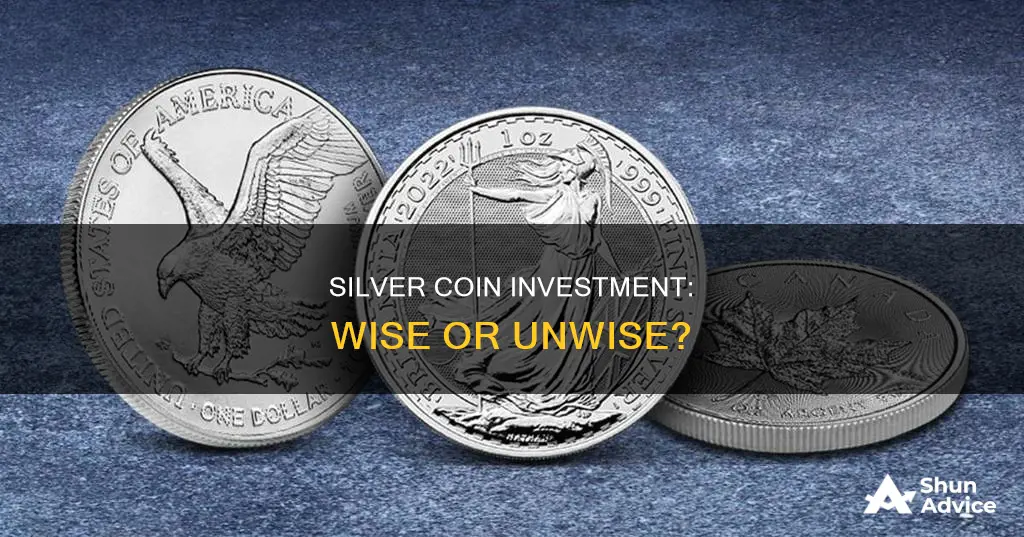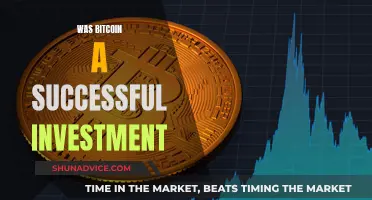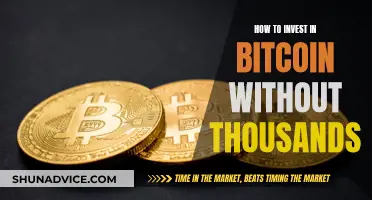
Silver has been a valuable commodity for thousands of years, and its value has been relatively stable. Silver is a good investment because it is a finite resource with a low supply and high demand. It is also a valuable asset with an intrinsic value that has never wavered over the centuries. Silver is also a good investment because it is a hedge against inflation and economic turmoil. Silver's value is not tied to the value of fiat currencies, so it can protect investors' wealth against inflation. Additionally, silver has industrial applications and is used in electronics, automobiles, mirrors, water purifiers, solar panels, and electric vehicles.
However, investing in silver also has its drawbacks. Silver is a volatile market, and its value fluctuates more than gold. It is also a speculative investment, and there is a danger of theft when storing physical silver.
| Characteristics | Values |
|---|---|
| Safe-haven asset | Silver is a safe-haven asset in times of economic and political turmoil. |
| Finite tangible asset | Silver is a finite tangible asset with an intrinsic value that has been used as currency for over 4,000 years. |
| Affordable | Silver is significantly cheaper than gold, making it a more accessible investment. |
| Higher returns than gold | Silver has outperformed gold in bull markets and tends to have a higher percentage gain when the price rises. |
| Historical lineage | Silver has been recognised for its value throughout history, providing a sense of stability. |
| Protection against inflation | Silver can act as a hedge against inflation as its value is not dependent on fiat currencies. |
| Store of value | Silver can hold its value and even appreciate over time. |
| Liquidity | Silver is a generally liquid market, and certain silver assets are highly liquid. |
| Less correlated to asset markets | Silver is less correlated to other markets such as stocks, acting as a hedge against them. |
| Diversification | Silver can help diversify an investment portfolio due to its low correlation with other assets. |
| Volatility | Silver is more volatile than gold, with higher highs and lower lows, presenting greater short-term opportunities and risks. |
| Industrial demand | Silver has industrial applications in electronics, automobiles, mirrors, water purifiers, solar panels, and electric vehicles, which can drive its price. |
| Supply and demand | Silver supply is relatively flat, and industrial demand is expected to increase, which could lead to a rise in its value. |
| Speculative investment | Silver is a more speculative and volatile investment compared to gold, with daily price movements. |
What You'll Learn

Silver is a valuable asset
Silver has been revered for its worth throughout the ages, passed down from heir to heir as a prized possession. It is portable, tangible, and valuable, making it ideal for investors who want to buy, take delivery of, or store their assets in high-security vaults.
Silver has consistently sustained its value as currency for over 4,000 years. In the last 15 years, the price of silver has more than doubled, rising by over 8% per annum in most currencies. Silver's value is not derived from any other asset, and it has proven to deliver significant value for investors, especially during times of economic uncertainty.
Silver is also a valuable asset due to its limited supply. The above-ground quantities of silver have declined significantly over the past century, and it is rarely recycled, making it a finite and rare commodity.
Additionally, silver has a wide range of industrial applications. It is highly sought-after in the technology and medical sectors due to its high malleability, resistance to corrosion, good thermal and electrical conductivity, and antimicrobial properties.
Silver's unique characteristics and role as a safe-haven asset make it a valuable and in-demand investment option.
Bitcoin Mining Stocks: Worth the Investment Risk?
You may want to see also

Silver is a hedge
Silver is a good investment option for those looking to protect and grow their wealth in uncertain times. Here's why silver is a hedge:
Hedge Against Inflation and Currency Risk
Silver is a valuable hedge against inflation and currency risk. Unlike paper currencies like the dollar, euro, and pound, whose purchasing power is eroded by inflation, silver's value is not dependent on the value of fiat currencies. In times of high inflation, local currencies can become worthless, and investors often seek safety in alternative currencies like silver and gold. Silver has historically been used as a form of money worldwide, and its value has been sustained for over 4,000 years.
Negative Correlation with Other Assets
Silver tends to have a negative correlation with other assets, such as bonds, shares, or property. This means that investors can protect their portfolios when these assets lose value. For example, during the 2011 Euro debt crisis, silver prices surged to a record high of nearly $50 an ounce as investors worried about another financial meltdown.
Protection Against Economic and Political Uncertainty
Silver serves as a safe haven during economic and political turmoil. When there are concerns about the stability of the financial system, as seen in 2023 with the collapse of Silicon Valley Bank, investors turn to silver as a store of value. Additionally, in times of war, stagflation, terrorism, natural catastrophes, and currency crises, silver can provide a hedge against risk.
Limited Supply and Industrial Demand
Silver has a limited and diminishing supply, making it a valuable commodity. Its above-ground quantities have declined significantly over the past century. Additionally, silver is highly sought after in various industries, including technology and medicine, for its unique properties. This increasing industrial demand further adds to its value.
Outperforming Gold in Bull Markets
Historically, silver has outperformed gold in terms of returns during bull markets. Silver usually rises by a higher margin than gold when the market is bullish. This makes silver an attractive investment option for those looking for higher potential returns.
In summary, silver is a valuable hedge against various economic and political risks. Its intrinsic value, negative correlation with other assets, limited supply, and industrial demand make it a good investment option for those seeking to protect and grow their wealth during uncertain times.
UK Bitcoin Investment: How Much Should You Invest?
You may want to see also

Silver is affordable
Silver is a good investment option for those who want to dip their toes into the world of precious metals without breaking the bank. At $17 an ounce, silver is a more affordable option compared to gold, which is priced at about $1,500 an ounce. This price difference makes silver a more accessible investment opportunity for those looking to enter the precious metals market without a substantial financial commitment.
The affordability of silver also allows investors to build their portfolios over time by purchasing small quantities. This strategy provides the benefit of dollar/euro cost averaging, which can help mitigate the impact of market fluctuations. Additionally, investors who need to liquidate their assets will find it easier to sell smaller amounts of silver compared to gold, where dividing bullion into smaller portions can be challenging.
Silver's affordability also makes it a practical and versatile investment option, especially for everyday investors who require flexibility in their investment strategies. The lower price point of silver means that investors can more easily convert their precious metals into currency without the challenge of breaking down larger bullion units associated with gold.
Furthermore, silver's affordability should not be mistaken for lesser value. Silver has been a revered and finite commodity for centuries, passed down from heir to heir. It has consistently sustained its value as currency and is recognised as a dependable investment with intrinsic worth.
In summary, silver's affordability makes it an attractive investment option for those seeking a balance between financial accessibility and the potential for profitable returns. Its lower price point compared to gold provides investors with greater flexibility, the ability to build a portfolio over time, and a more liquid asset that can be easily converted into currency when needed.
Should You Invest Your Pension in Bitcoin?
You may want to see also

Silver offers higher returns than gold
Silver has the potential to offer higher returns than gold. In a bullish market for precious metals, silver prices tend to rise by a larger margin than gold. For instance, in the 1970s, silver prices soared by 3,800%, while gold prices increased by 2,500%. Silver is also more affordable than gold, making it more accessible to investors.
Silver is a valuable asset that has consistently sustained its value as a currency and store of value for over 4,000 years. It has intrinsic value and is not derived from or anchored to the value of other assets. Silver also acts as a hedge against economic uncertainties, inflation, and currency risks. Its value tends to rise during times of economic uncertainty, such as the 2011 Eurozone debt crisis, providing a cushion for investors against potential losses.
Additionally, silver is a scarce resource, and its supply is unlikely to increase significantly, even with rising prices. This scarcity, coupled with growing industrial, technological, and medical demand, further enhances its investment potential.
However, it is important to note that silver is more volatile than gold, and its performance is closely tied to the overall economic health. Silver is also more susceptible to theft and has lower liquidity compared to gold.
Ally Invest: Buying Bitcoin, Explained
You may want to see also

Silver is a good long-term investment
Secondly, silver is a hedge against economic uncertainty and inflation. Its value is not derived from other assets or paper currencies, so it can protect investors when stocks, shares, or property lose value. During times of economic uncertainty, the price of silver tends to rise significantly, as seen during the 2011 Euro debt crisis. With the current global economic risks, silver will likely play an increasingly important role in safeguarding investments.
Thirdly, silver is affordable and accessible to investors. At a lower price point than gold, silver provides an entry point into the precious metals market, allowing investors to build a portfolio over time. Silver is also more divisible and easier to sell in smaller portions compared to gold.
Additionally, silver has industrial applications and is in high demand across various sectors, including technology, medicine, and energy. It is used in medical equipment, mobile phones, solar panels, and electric vehicles. As these industries continue to grow, particularly in manufacturing hubs like China, India, and Vietnam, the demand for silver is expected to increase, driving up its value.
Lastly, silver has historically outperformed other asset classes, including stocks, over certain periods. Its price has risen more than 40% since 1915, outpacing inflation. While silver can be volatile in the short term, it has the potential for significant gains and is a smart choice for investors looking to protect and grow their wealth over the long term.
Gold Coin Investment: A Guide to Smart Buying
You may want to see also
Frequently asked questions
Silver has been a recognised store of value for thousands of years, and its value has increased over time. Silver is also a good hedge against inflation and economic uncertainty, and it's more affordable than gold.
Silver is a volatile asset, and there is a danger of theft if the coins are stored at home. It may also be difficult to sell silver coins quickly if you need cash in a hurry.
Silver coins are more divisible and easier to sell than silver bullion, which may require an assay to verify its weight and fineness. On the other hand, silver bullion is more cost-efficient for larger quantities of silver.







